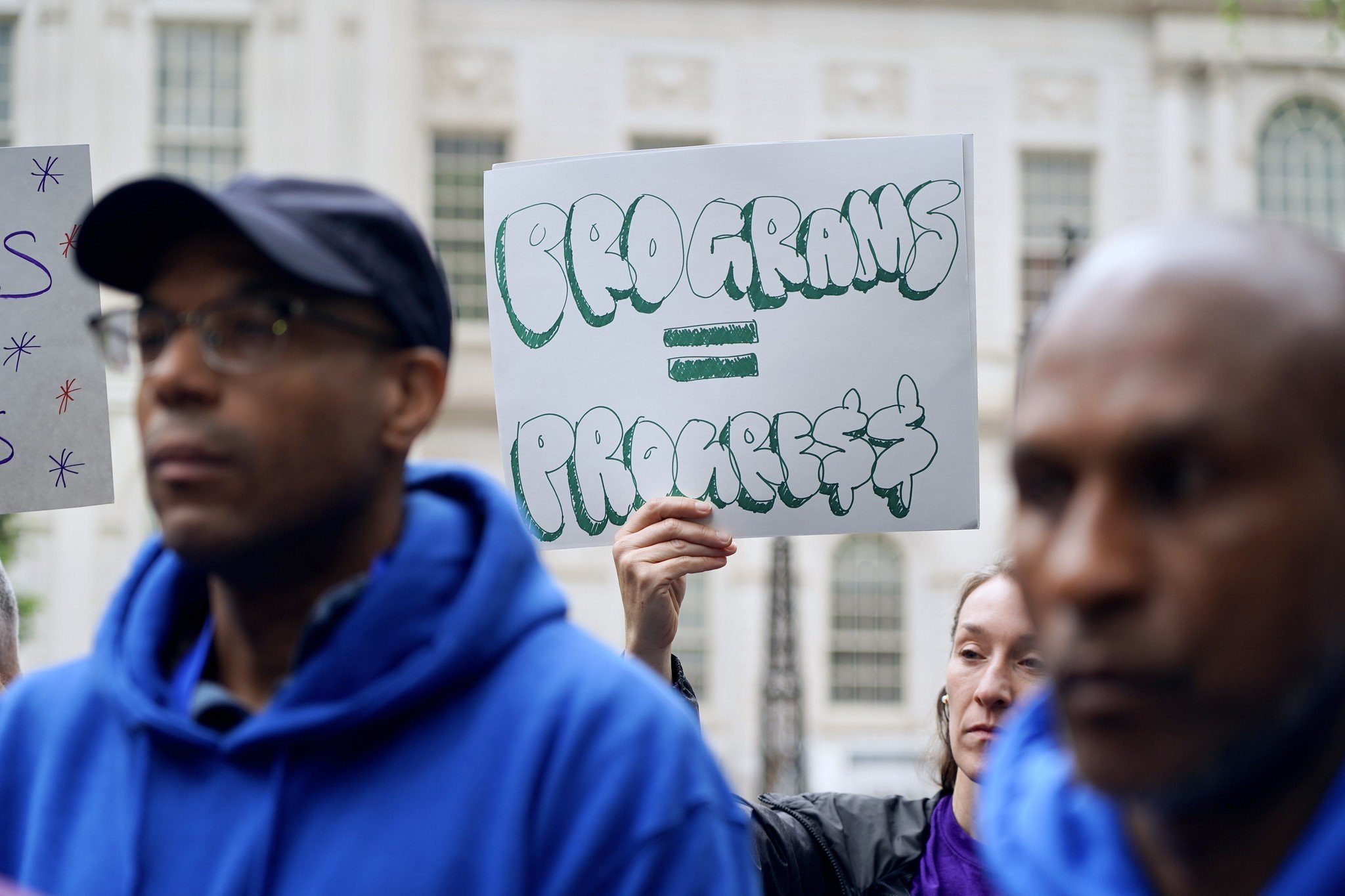Detainee programming on Rikers declined after DOC cut ties with nonprofit providers
/The Department of Correction has struggled to provide detainees social service programming after cutting ties with five nonprofit service providers last summer, according to the recently released Mayor’s Management Report. File photo by Gerardo Romo/NYC Council Media Unit
By Jacob Kaye
The city’s Department of Correction has struggled to provide re-entry services, educational programs, life skills training and other programs to detainees after cutting ties last year with around a half dozen nonprofit service providers as a cost savings measure.
During the first four months of Fiscal Year 2024 – which began in July 2023 – the number of group-based programming offered to detainees on Rikers Island dropped by 29 percent and one-on-one sessions dropped by over 30 percent when compared to the first four months of Fiscal Year 2023, according to the recently released Mayor’s Management Report.
The decline came immediately after the agency prematurely terminated a $17 million contract with five nonprofit service providers that had spent the past several years running anger management, parenting skills, workforce development, vocational training, social services and other programs on Rikers Island. The DOC’s decision to end the contract – which amounted to less than one percent of its total $1.2 billion budget – came after Mayor Eric Adams ordered one of several across-the-board budget cuts to city agencies last year.
In addition to group-based programming, the Department of Correction – which promised last year that programming would not be lessened in either quality or frequency after being moved in-house – generally failed to get its programming up to the level it was offered to detainees when the nonprofits were operating in the city’s jails.
According to the Mayor’s Management Report, the overall number of detainees participating in programs, services and activities dropped by around six percent at the start of Fiscal Year 2024.
During the first four months of Fiscal Year 2023, when the nonprofits were providing programming in Rikers, there were over 11,300 one-on-one programming sessions offered to detainees. That number dropped to 7,878 in the first four months of Fiscal Year 2024, according to the report. Group sessions fell from 14,323 to 10,221 in the same time period.
Advocates and lawmakers say that the decline in programming proves what they warned of last year when the cuts were abruptly announced – the DOC wasn’t up to the task of providing the services themselves.
“It's disappointing,” City Councilmember Sandy Nurse, who was recently named chair of the Council’s Committee on Criminal Justice, told the Eagle on Wednesday.
“[The mayor] told us they could [continue offering the programming] and that they had the capacity, but we knew that was false because of the fact that they cannot adequately keep people alive in our city jails,” Nurse added.
The DOC made specific note of the decrease in programming in the Mayor’s Management Report, though it blames the discrepancy between the numbers in the first four months of Fiscal Year 2023 and the first four months of Fiscal Year 2024 on a severed contract with a different nonprofit provider halfway through Fiscal Year 2023 in December 2022. However, the contracts it cut with the five other providers, which included The Fortune Society, The Osborne Association, SCO Family of Services, Greenhope Services for Woman and Fedcap Rehabilitation Services, came at the very start of Fiscal Year 2024, the period in which programming began to decline.
According to the DOC, moving the programming in-house also led to an exodus in staff from the agency's Division of Programs and Community Partnerships, who were asked to fill the hole left by the providers.
“Beginning in the fall, staff attrition among the staff offering group-based services in the Division of Programs and Community Partnerships also contributed to this decrease, as well as to a 31 percent decrease in one-on-one sessions,” the report reads.
A spokesperson for the DOC told the Eagle in a statement on Wednesday that the agency “continues to make every effort to afford all persons in custody access to evidence-based programs and services.”
“Despite staffing attrition, the Department is also working to backfill vacant positions as they simultaneously provide enrichment and re-integration programs in all areas and educational opportunities to their young adult population and adults as available,” the spokesperson added. “Their partnership with various community-based organizations and dedicated volunteers who devote their time to providing services, group-based programs, and resources to the incarcerated population is also ongoing.”
No contract, no contact
The DOC’s decision to sever the contracts, which were originally scheduled to run through March of this year, came as a surprise to the organizations last year. The cuts were announced a little more than a month before they went into effect.
“We were completely shocked,” Ronald Day, the former vice president of programs at the Fortune Society, told the Eagle in May of last year. “Throughout the more than three decades that we've been doing this work, there has never come a time when there was ever a discussion about eliminating a program, as they are talking about doing now.”
Shortly after the cuts were announced, the providers and lawmakers warned that the DOC would be unable to replicate the programming, especially given that it had only blocked out a month to train its staff to do so.
“I think Corrections is struggling to do the job that we are asking them to do right now,” Public Advocate Jumaane Williams said during a protest against the cuts in June. “There's a lot of issues there. Let's focus on that. Don't take a whole other thing that you have to put onto your plate right now.”
“They also don't have the expertise,” the public advocate added.
Despite the lack of faith in their ability, DOC leadership, including then-Commissioner Louis Molina, attempted to assure lawmakers that detainees would not see a noticeable change to the programming offered to them.
“The Department will assume the responsibilities previously carried out by contracted providers, and continues to offer dozens of additional programs to people in custody, including educational programming, fine/performing arts, and other enrichment activities,” a DOC spokesperson told the Eagle in May.
In justifying the cost-saving measure, DOC brass claimed that attendance in the programming offered by the nonprofits had declined.
However, that claim appears to be disputed by the agency’s own data released in the Mayor’s Management Report released on Tuesday.
In Fiscal Year 2022, around 7 percent of incarcerated individuals participated in programs, services and activities, according to the report. However, that figure more than doubled to 18.2 percent the following year, the first year the now-severed contract with the providers was in effect.
After cutting the contract, participation in the DOC-run programming plummeted to 12.7 percent during the first four months of Fiscal Year 2024.
The types of programming cut by the DOC are often touted by advocates, providers and progressive lawmakers as a successful way to lower recidivism rates, prevent crime and decrease violence within the city’s notoriously dangerous jail complex, where over two dozen people have died since Adams first took office.
“It just blows my mind that the mayor is talking out of one side of his mouth about going hard on public safety and that he is the mayor of ‘crime down, jobs up,’ but he is totally missing a huge class of people who are really in need of support so that they can be positive, productive members of our communities,” Nurse said.
City Councilmember Sandy Nurse, the chair of the Criminal Justice Committee, called the decrease in programming on Rikers Island “disappointing.” File photo by John McCarten/NYC Council Media Unit
“The mayor has focused primarily on the NYPD, boosting up the boots on the ground,” Nurse added. “He's focused on a huge pay raise for them, which is fine, but if you're not also additionally putting even more energy into preventative, in-detention and post-detention services, you're not actually disrupting community violence and the cycle of recidivism.”
Stanley Richards, who recently was named the CEO and president of The Fortune Society, said that while any programming on Rikers Island is beneficial for detainees, they are most successful when run by third-party providers, many of whom employ formerly incarcerated New Yorkers.
“Having an outside provider coming in to provide services is a way for people to stay connected to what happens in the outside world,” Richards told the Eagle earlier in January during an unrelated interview prior to the release of the Mayor’s Management Report. “When they eliminated all of the nonprofit service providers, they eliminated that contact.”
“That cannot be replaced by DOC because [detainees] are going to see DOC as the people who are responsible for their detention,” he added. “And that's a problem.”
According to a DOC spokesperson, the agency is currently in discussions with a number of the providers about potential “future partnerships.”
But Richards said that while he hasn’t had conversations with DOC leadership about bringing the providers back into the jails to provide programming, he would jump on the opportunity to do so.
Similarly, Nurse said that she’d press the DOC to address its programming gap during the Council’s upcoming Criminal Justice budget hearing – the hearing will likely be the first time recently-appointed DOC Commissioner Lynelle Maginley-Liddie appears before the Council.
“I think that this report shows that the DOC is not capable of meeting the targets its needs to meet to make sure that people come out of these facilities in a better state than when they came in,” Nurse said. “We'll be fighting very hard for these programs to make sure that we are setting people up for success.”
“We are absolutely missing the mark,” she added.





